Our Alberta curriculum consists of learner outcomes that are specific to each grade level. Go to Alberta My Child's Learning: A Parent Resource for more information about the curricular outcomes that your child will be learning this year.
Assessing and Reporting Student Progress
GS Copy of WRPS Assessment and Reporting Handbook 2022-2023
Reporting students’ progress will be done formally, informally, and as the need arises during the school year. Teachers shall discuss assessment with students, in an age-appropriate manner, at the beginning of instruction. Where feasible, students shall be involved in decisions about methods of assessment and scoring scales. Teachers will endeavor to provide students with rubrics/study guides/criteria/exemplars for summative assignments before an assessment is administered. A variety of assessment tools are used to monitor and assess student growth and achievement. These include teacher observations, oral and written exercises and assignments, student projects, and teacher-developed and standardized tests. It is our aim to gear your child’s program to his/her ability and progress. We encourage parents to contact their child’s teacher whenever there are questions or concerns.
Collaborative Response
All schools in WRPS are implementing Collaborative Responses to meet students' needs. The staff works collaboratively to review student data/ progress, identify students’ strengths and challenges, and provide strong core instruction and strategic intervention as required to improve student learning. Every child deserves a team!
Student Recognition
Students earn GS “Golden Tickets” for demonstrating our Griffin values at school. The Golden Tickets are entered into bi-weekly draws for prizes.
Students in grades 7 and 8 are recognized at the annual Griffin Awards Evening for their academic achievement if they meet the criteria for Merit, Honours, and Honours with Distinction.
Students in grades 5 - 8 are recognized at the annual Griffin Awards Evening for their achievements in citizenship, fine arts, literacy, and athletics.
CTF and Field Trips
Students in grades 5 - 8 participate in Career and Technology Foundations.
CTF provides students in grades 5 to 9 the opportunity to explore their interests within various occupational areas and technologies. Through CTF, students may plan, design, create, and implement solutions for relevant real-life problems. CTF at GS may include Foods, Woodworking, music, drama, art, sports, science, active living, leadership opportunities, and academic support. Students may choose the academic support class and sometimes teachers will place students in that class when they require extra support in a specific subject.
Student learning happens in and out of the classroom. At GSS teachers may plan a variety of field trips and events which enhance student learning. Parents will receive information and will need to sign an online consent form if their child’s class is participating in a field trip.
Extra-Curricular
Extracurricular programming may be offered throughout the school year. Fees for school sports teams will include the cost of participating in the league and bussing. Parents may qualify to access Jumpstart funds to help cover the cost of their child’s extra-curricular fees. Contact the school if you have questions.
Parental Involvement
We encourage and appreciate parent involvement at GSS. School newsletters will be emailed monthly. Updates will be sent as needed to inform you about upcoming school events. You are welcome to attend special events and assemblies. You may choose to volunteer at GSS by reading with students, supervising field trips, and helping out with activities/events that happen throughout the year. All new volunteers at GS will be required to complete the WRPS volunteer forms and have a criminal record check completed.
Please join the Parent Advisory Committee as another way to become informed and involved in your child’s education. Monthly meetings are held either in person or online. The meeting notices and agendas are posted on the school website.
How To Help Your Child at Home
- Make sure your child attends school every day so they can learn what is needed to do well in school and achieve learner outcomes.
- Take an interest in your child’s school work and review assignments/tests that are marked and sent home.
- Stay in contact with your child’s teacher(s). Read notices, newsletters, and notes to stay informed about what’s happening in your child’s classroom and at school.
- Encourage your child to do their best on all of their schoolwork.
- Provide a quiet place at home for your child to do homework assignments that reinforce their learning at school.
- Work with your child at home as well as with the school and teacher(s) to increase your child’s literacy and numeracy skills.
- If you have any questions or concerns about your child’s success at school, please contact your child’s teacher first. They will be able to provide details and information that you may need. If there is a concern that is not resolved after meeting with the teacher, the school administration may become involved. The goal is to resolve concerns, find solutions and move forward in a positive manner.
- Stay up to date by going to www.griffithsscott.ca for all school information.
